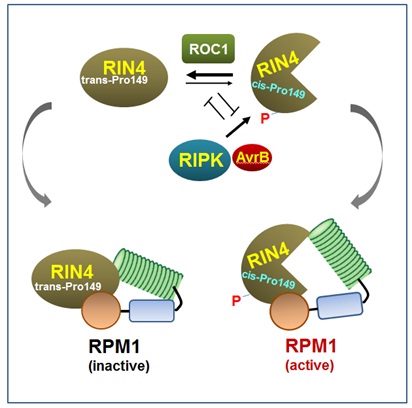Like animals, plants are capable of recognizing invading pathogenic microbes through immune receptors and activate innate immunity. This is crucial for plant’s survival in an environment with numerous potential pathogens. These immune receptors are tightly regulated, meaning that they are only activated upon pathogen invasion. At molecular level, how these immune receptors are controlled remains poor-understood.
A research team led by Prof. ZHOU Jian-Min of the State Key Laboratory of Plant Genomics, Institute of Genetics and Developmental Biology (IGDB), Chinese Academy of Sciences and Prof. LIU Dong from Tsinghua University identified a new mechanism controlling the Arabidopsis immune receptor RPM1. The study showed that the peptydylprolyl-isomerase ROC1, which catalyzes cis-trans isomerization of its substrate proteins, played a key role in the control of RPM1 activation. ROC1 directly interacted with and isomerizes RIN4, a protein previously known to regulate RPM1. Molecular and genetic evidence suggested that the configuration of a proline residue within RIN4 was modulated by ROC1, which ultimately controled the activation of RPM1. The infection of plants by a bacterial pathogen led to a change of RIN4 configuration in favor of RPM1 activation. The findings provided a new understanding of plant innate immunity.
The work, conducted in close collaboration with Prof. Gitta Coaker at University of California, Davis, Prof. XIA Bin from Peking University, and Prof. SHEN Qian-Hua of IGDB, was published online in Cell Host Microbe (DOI:
http://dx.doi.org/10.1016/j.chom.2014.09.007) on October 8, 2014. LI Meng, a PhD student in the ZHOU’s lab was the first author of the paper.
AUTHOR CONTACT:
ZHOU Jian-Min, Ph.D.
Institute of Genetics and Developmental Biology, Chinese Academy of Sciences, Beijing, China.
LIU Dong, Ph.D.
School of Life Sciences, Tsinghua University, Beijing, China
Reference
Li M, Ma X, Chiang YH, Yadeta KA, Ding P, Dong L, Zhao Y, Li X, Yu Y, Zhang L, Shen QH, Bin X, Coaker G, Liu D, and Zhou JM (2014). Proline isomerization of the immune receptor-interacting protein RIN4 by a cyclophilin inhibits effector-triggered immunity in Arabidopsis. Cell Host Microbe 16, 473-483.

Figure. Model for RPM1 regulation by ROC1 and RIN4. (Image by IGDB)



